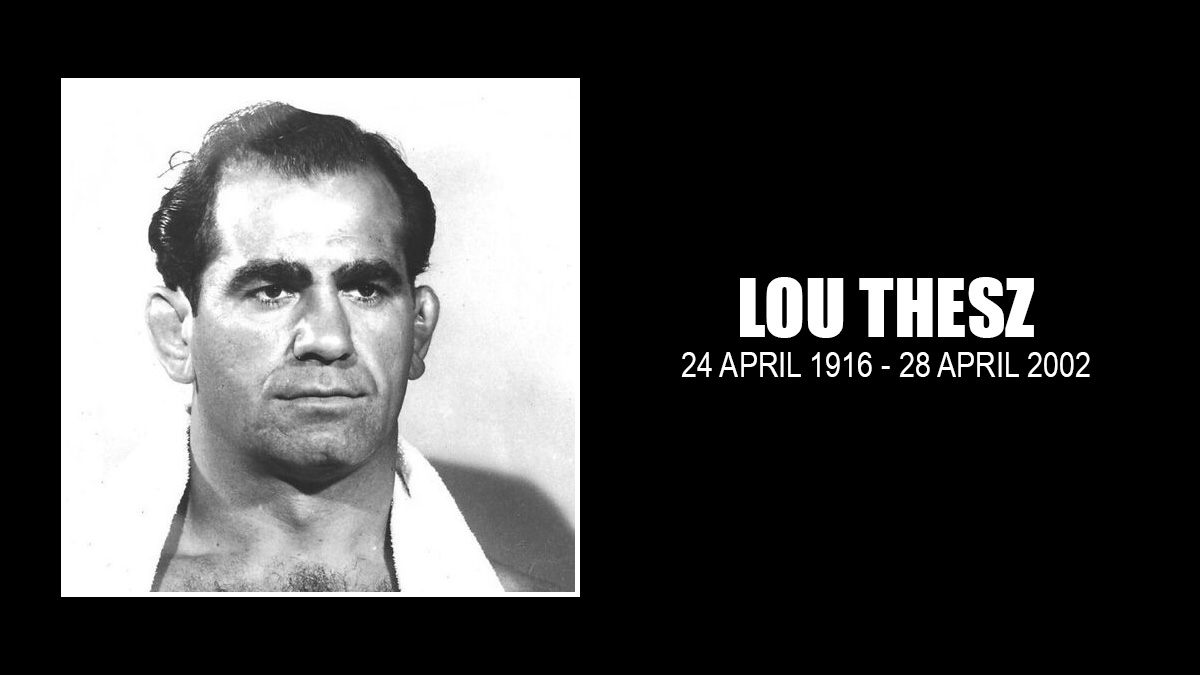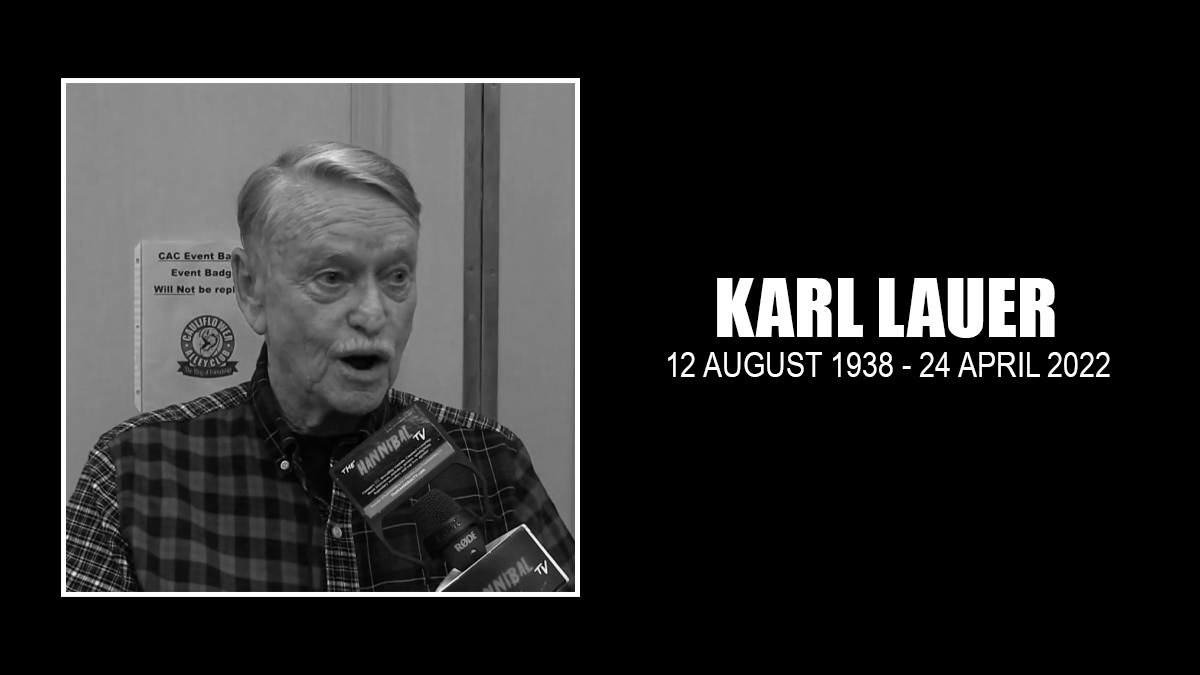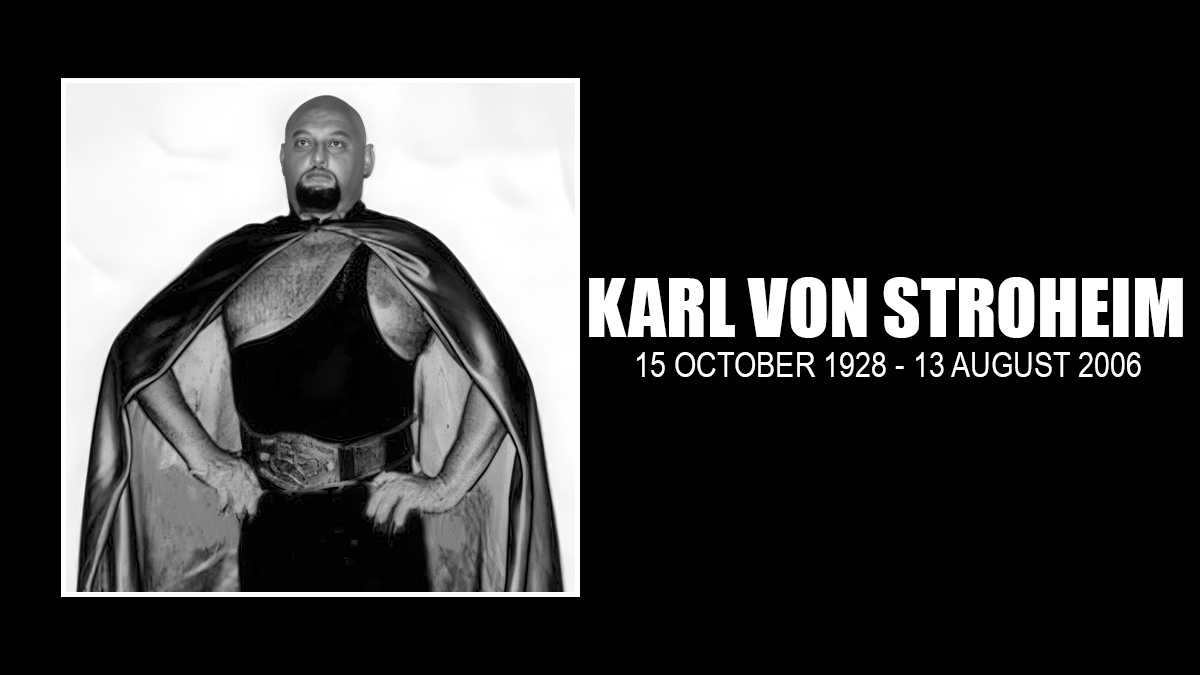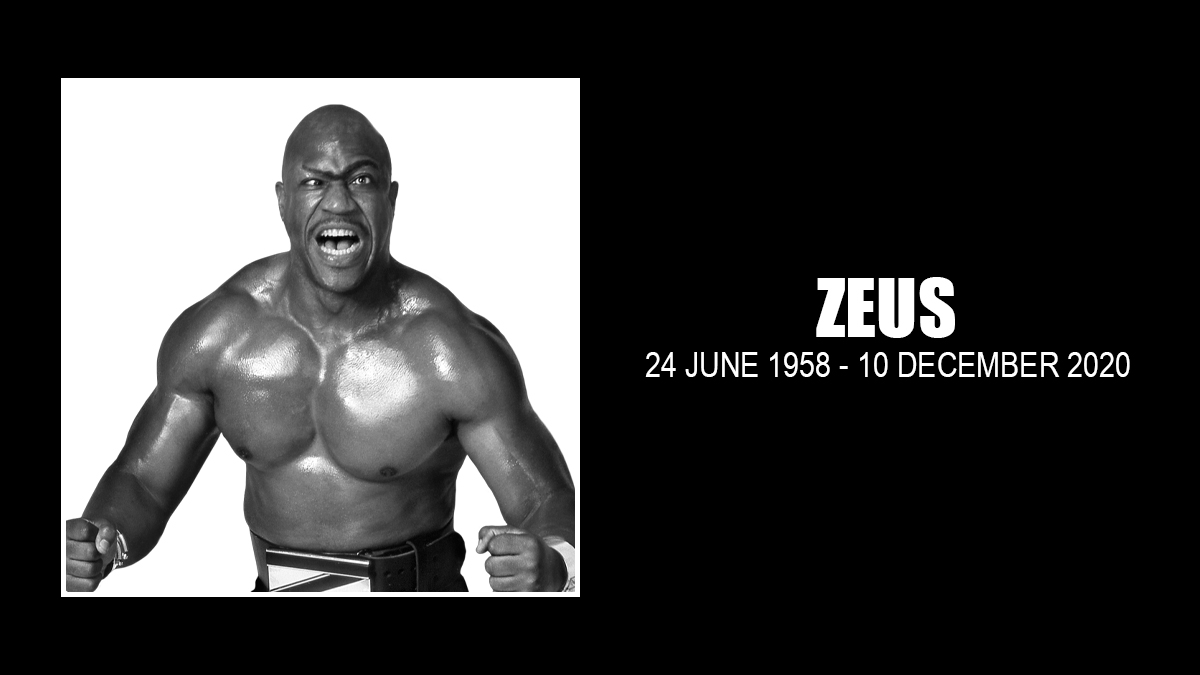Today, April 24th, would have been the 100th birthday of Lou Thesz, perhaps the greatest champion of them all. To celebrate the occasion, we have collected a number of stories from other wrestlers about Thesz, who died in 2002.
Scott Casey interview with Scott Teal, circa 2001:
“Lou Thesz was still a great name, even though he was an older guy. He was in his late 50s or early 60s. He was watching the matches through a crack in the curtain one night. I walked up behind him and said, ‘Lou! What are you doing?’
“He said, ‘I’m watching the matches, kid.’
“I said, ‘You’re the World champion. You’ve been the champion seven times. Why would you want to watch a match?’
“He said, ‘Because everything I do out there, someone did it before me. I learned to imitate those people and I learned my craft from them.’
“After that night, I watched the matches all the time.”
* * *
Gene Kiniski:
“Ninety percent of the guys didn’t want to wrestle him, because he beat the shit out of them.”
* * *
Nick Bockwinkel on Lou Thesz:
“Lou Thesz, if he was working with a guy that for all intents and purposes didn’t have any ability, Lou would just annihilate the guy, just grind him into the ground. The match would be the shits. The promotion didn’t get its money’s worth. I just thought that I shouldn’t do it. If the promotion’s stuck in such a bad way that they have to give you an opponent that is this useless, this meaningless, as my dad always used to say, ‘It’s tough pulling bullets out of shit, but sometimes that’s going to be the challenge.'”
* * *
Don Leo Jonathan on Lou Thesz:
“Buddy Rogers came down into Florida. I wrestled Lou Thesz, and then Buddy was supposed to wrestle him. Well, I wrestled Lou and then Buddy was going to wrestle him the next week. Lou and Buddy never got along that well.
Buddy says, ‘No, I’m not going to wrestle Lou. I’ll wrestle him later. I’ll wrestle him the week after.’
So Lou asked the promoter, ‘Hey, let me wrestle with Jonathon.’
I took Buddy’s place and, as it worked out, Lou and I worked about 10 matches. Buddy never did wrestle Lou in Florida there. Lou says, ‘We’ll show this guy that there’s other guys that can draw houses.'”
* * *
Bob Roop on Lou Thesz:
“Lou and I worked a few times, and he was always very respectful in the ring, and I was to him. We had good matches. They were solid. There weren’t a lot of highspots, two tackles, a hip throw and all that. There was a lot of wrestling. Lou was much older than I was. The matches were probably, if you put this match out there in the ’50s, it would have been good, real good, or in Japan, even at that time, would have been considered a real good match, being that it was a cold match.
“I remember one time in Chattanooga, it was a cold match, there was no heat between us going into it, it wasn’t that well received, because right before us, there were guys running around doing all kinds of highspots, gimmicks, managers interfering. Afterwards, it was Jerry Lawler and somebody. It wasn’t a barnburner in terms of the audience going crazy. I think the people, they said, it’s a good match; it just wasn’t their cup of tea.
“Lou had his style, and when I was working with him, I let him; Lou kind of led the match, I wasn’t going to fight him about that. But it was a good match. I wanted to do what he wanted to do, what he was comfortable doing, because he had to be 60 even then, or older. In the wrestling business, that isn’t that old. I guess I was still a mark in a way; I was thinking that anybody that old … but I knew he didn’t look good running around the ring. He didn’t look good doing highspots because he was tall and lanky. He wasn’t awkward, but a little pigeon-toed, I think.
“I always respected the guy. A lot of that came from the way the other people in the business respected him. He was very well thought of. He was one of the boys. He had a little bit of reserve to him, but he was genial, he was collegial, he always treated me with a lot of consideration.”
* * *
Ted Tourtas, April 2010 at Cauliflower Alley Club reunion:
Q. What did you think of Thesz as a wrestler?
A. Thesz was good. He was good. But it’s funny. In the Army, they made Lou a baker. A baker, yeah. Worked in the bakery. And had idiots who didn’t know how to put a jockstrap on, hand to hand combat. And they didn’t know how the hell to wear a jockstrap, forget hand to hand combat. And Lou was a good wrestler; he’s making donuts. That’s how the Army worked.
* * *
Mark Lewin to Steve Johnson, on winning the WWA title from Thesz, putting him to sleep in the middle of the ring:
“The year I was born was the year that he won the heavyweight championship and here I was in the Olympic Auditorium wrestling Lou Thesz who, by the way, moved like cat. There was no one any better.”
Thesz came over his left shoulder. “I saw he was on other side of the ring and he was coming off so fast I don’t even know how I got underneath him to slam him. …
“It was like Lou Thesz, put him to sleep in the Olympic Auditorium there. [Matchmaker Jules] Strongbow came up and said, ‘You know Mark, you could count on one hand the people that have beaten Lou Thesz.’ I looked down at him on the mat asleep. Mark Lewin had finally arrived in my own mind because I had watched him as a kid in Buffalo, in Memorial Auditorium.”
* * *
Paul DeMarco on Lou Thesz:
“He was early ’50s. I met him and I was watching him. He was in Toronto and I was there with him. He had already been out of the business, and he just came in to work for Tunney. We were in a spot show for Toronto, and I was just a rookie at that time. I watched this guy go out to the ring. He went out there and he tore that place apart. … He did it all on the ground. Then one time, I wrestled Thesz, in 1968, when I was Georgia State champion, and Thesz was World champion — he was World champion in ’37, when I was born. And I wrestled him in Georgia, in the main event, sold out, completely sold out. I first grapped a hold of him, and he said, ‘Grab a hammerlock.’ And he goes right down on the ground. And he stays on the ground.”
* * *
Frankie Cain, January 2011, to Steve Johnson:
“Lou was a fair wrestler, never a great wrestler, he was a fair wrestler in comparison to like Ben Sherman and guys I had met. My god, I had met human destruction machines that would have beat Lou just by grabbing at him. But Lou looked the part and when he wanted to, he was a hell of a worker.
* * *
Jim Ross, July 23, 2011, upon receiving the Lou Thesz Award from Tragos/Thesz Hall of Fame:
“I want to thank you all for this honor, because receiving this Lou Thesz Award, for me, I feel like a pair of brown shoes at a formal wedding. Lou Thesz I met in 1974 when I first got into the wrestling business. He was a god. He was Gable-like, he was Dan Hodge-like. He had no business talking to a guy like me who was putting up the ring, I was refereeing, and who had never in his life made more than $25 in one day in the pro wrestling business.
“My daddy thought that I had run off and joined the circus, and that I would come home one day. I never came home.
“Lou Thesz took time in 1974 to give me the time of day. I thought I’d say, ‘Hello, Mr. Thesz and leave.’ He gave me time. He knew my passion. He knew I loved the business. He knew I wanted to be where I was at 25 bucks a day. There were no contracts, no bonuses, no 401k, there was no insurance. There was me and a crazy first wife making $25 a day, all in.
“And Lou Thesz was a gentleman to me and was a wonderful role model, because he was handsome and tanned and tall, statuesque, he dressed well, he carried himself with class and dignity. He gave our business, the grunt and groan business, that had separated the amateur world from the pro world for so long dignity and pride. I will never forget those first minutes with Lou Thesz. I cannot believe I’m here to receive anything but Lou Thesz’s parking spot every third year at the Hall of Fame on the third Sunday of March.
“Lou Thesz was DiMaggio and Gehrig combined, and I was the batboy who just wanted to play on the team. …
“The wrestling business has been really cool to me. I’d like to be able to come back on an annual basis. I have no idea how I got this award. Lou Thesz, to me, is a deity. I am an overachiever. I never quit, I never gave up my passion, I never would allow myself to be outworked or outperformed — but I don’t understand how I can be spoken of with Lou Thesz in the same sentence. I am very humbled to be here. I’ve had a wonderful time in Waterloo. I accept this honor with a great deal of pride and gratitude, and can only close by saying, that this night has been one hell of a slobberknocker.
* * *
Nick Kozak, interviewed August 1, 2011:
“I thought a great deal about him. He got along pretty good. I just thought, the way he was, he was real professional. He just had a robe, it looked like a bathrobe. It wasn’t flowery or anything else. When he took it off, you knew he could do things, because it looked like he was in shape.”
* * *
Danny Hodge, October 21, 2011, on wrestling Lou Thesz in January 1968, where he won the TWWA belt in Japan:
“I felt it was a great honor even to get to wrestle him. He had just won back the championship and I thought it was fantastic that he defended it against me in Toyko. Can you see what a thrill it was for me? They had a trophy that was over six foot high out in the middle of the ring. And the crown went absolutely benign. It was one of the greatest thrills of my life, the first one was winning the world’s junior heavyweight championship so at that time I held both titles. …
“Lou was terrific to wrestle with. He knew wrestling and you could wrestle holds. First time I wrestled him was down in El Paso. Of course he’s got the wristlock, takedown, and he figure-fours the arm with the leg. I rolled back he kicked the leg, kicked me down. I rolled back and lifted him straight up and sit him upon the corner of the rope. His eyes got big because no one’d ever done that to him.”
“He was a joy, a blessing. We wrested numerous times in El Paso and Amarillo and New Orleans and several places. And the matches, time run out or he got disqualified. In Japan, I won. I was more shocked than anybody. It was a feeling like I never thought anything like this would ever happen. Here I am the world junior heavyweight and the heavyweight champion at the same time.”
“Lou was, I’d say, fighting for his life. Can I put it more plainly like that? The surprise was that he dropkicked me out of the ring. I got up in it, and he gave me another dropkick and then I come up and flew through the ropes and hit him in the stomach and cradled him and one, two, three. I’m shocked he didn’t kick out and the match was over. When he handed me the belt, I had almost tears in my eyes. You can’t even imagine my thoughts. Here is the world’s heavyweight champion and here I’ve got this prestigious belt.”
“He was just a great, great athlete, a great, great friend. I couldn’t have had anyone better to wrestle with than Lou. I learned so much from Lou. I learned how to short-arm scissor you. Hey, it’s a deadly hold. When you get something put on you, you learn from it. I used many things that he used.”
“He was a champion in the ring and out of the ring. I couldn’t ask for a better opponent, a wrestler’s wrestler. Lou didn’t have a lot of amateur but he came from the school of hard knocks.”
* * *
Johnny Powers, January 15, 2011, on someone he looked up to as a hero:
“Thesz always impressed me because he was classy, and [Johnny] Valentine because he was strategic. And both of them worked as babyfaces, but they were always a tough babyface. … Thesz, when I met him and watched him, he emanated from the ring a classical character. I think that influenced a lot of my not going off the edge as a heel, and not going off the edge as a babyface.”
* * *
Rip Hawk, multiple interviews with Steve Johnson, 2008-2009-2010:
“One time, Lou Thesz and I were invited to do the Phyllis Diller show. We had a few lines we had to say on that show. I thought, this is a pretty good deal to get on the Phyllis Diller show. She was just becoming a hot item at that time, back in ’59, ’60, something like that. I think she was subbing in for Barbara Peters or some big singer. We made that show and they opened up with the camera on her, she was lying on the floor, and they had the camera zoom in on her. She had a checkerboard dress on, real shiny thing, with zebra shoes. You had to be there to understand. It was hilarious. Thesz and I, we broke up a little bit there. Then we started with the show. She come to us, well she was coming off the wall with so many things I forgot my lines and I know Thesz did so we were like babbling idiots. But we got through the show, everybody thanked us for making it. She ad libbed for us, covered up all our mistakes, which to me made her a pretty generous woman. Of course, she didn’t wan to be a flop either.
* * *
Ricky Steamboat, April 18, 2012, Cauliflower Alley Club reunion, during his acceptance speech for the Lou Thesz Award:
“I’ve got a Lou Thesz story. … and this is the award. 1984, I had a gym, Charlotte, small place, a blue-collar gym, and Lou Thesz shows up and he wants to work out. Goes in there and there’s a couple of guys working on the seated rowing machine. These guys are gassed to the gills, about 280, young, early 20s, juiced up alright. Lou was standing there, he has the classic gym shorts on with the white socks and that white towel. He was just sort of standing there, waiting for them to get done.
The two boys, they stand up and they say, ‘You want to do this over here, old man?’
He says, ‘Yeah, but I can wait until you’re done.’
They had another couple of sets to do. One of them reaches down and pulls the pin out. Now they had a 300-pound stack on the seated rower, and they were doing 300 pounds. He pulled the pin out and says, ‘Where would you like me to put it? You want to start at about 100?’
Lou says, ‘You can put it back where you had it.’
‘What are you talking about, old man?’
‘Yeah, put it down there at the bottom, 300 pounds.’
The guy bends down and sticks the pin in. Lou walks over and grabs the handle off the floor. He’s got the one handle, and as he’s sitting down on the seat, he pulls the whole 300-pound stack with one arm, and then adds the other and proceeds to do about 15 reps with it. There you go, that’s Lou Thesz. Those other two guys, they walked out of the gym. They left. Just a little story about Lou Thesz and this award.
“With everything that that man’s done, I’m so proud to be thought of in same breath, and to receive this Lou Thesz Award. To be recognized by all of you, it’s a wonderful feeling. Thank you so very much.”
* * *
Dave Meltzer, editor of the Wrestling Observer Newsletter, after Thesz’s death in 2002, to Alfonso A. Castillo of Newsday:
“All the wrestlers had respect for him. He had a reputation for being a guy not to mess with. I never could envision that Lou Thesz would ever die.”




